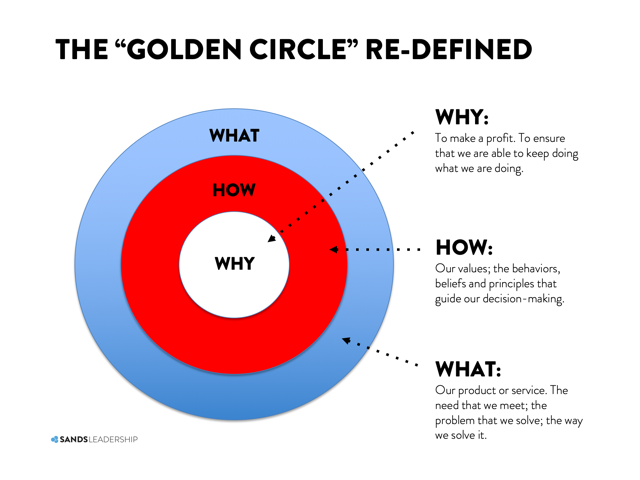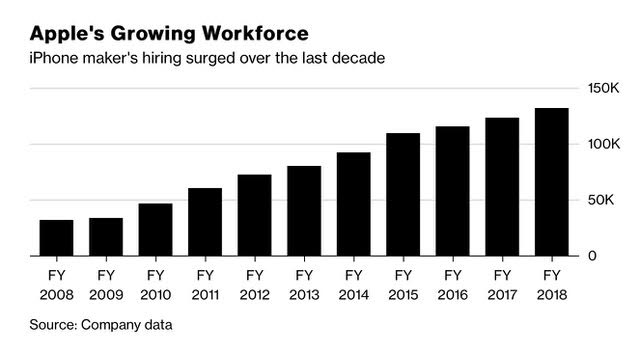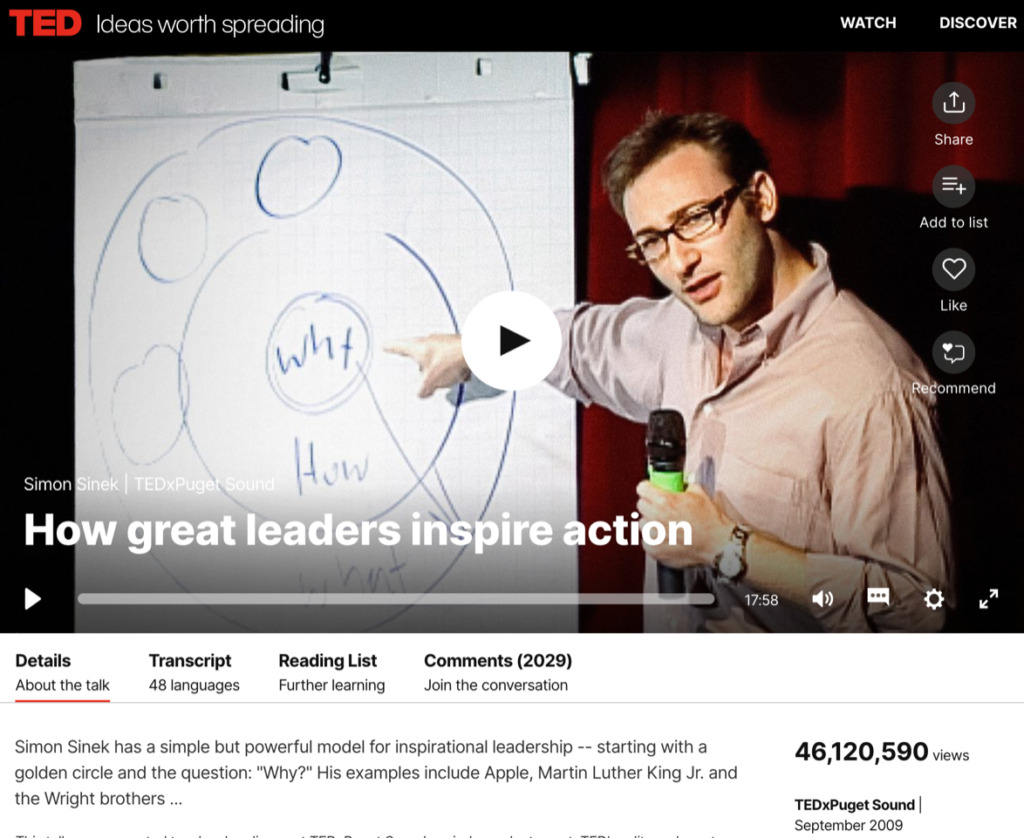By Ben Sands
In his seminal TED talk, author Simon Sinek offers a simple, compelling framework to explain how the best companies, and leaders, “think, act and communicate.”
In a nutshell, Simon suggests that they “start with why” (i.e. they lead with why they do what they do; “their purpose”).
Average organizations and leaders, Sinek suggests, start with the “what” (i.e. what they do or what they make; their product or service) without giving any explanation of the “why.”
Sinek makes a powerful and persuasive argument and the presentation, How Great Leaders Inspire Action, has been watched over 46 MILLION times.
I’d guess that I’m personally responsible for at least 100 of those views.
I’ve shared clips of his talk in workshops and coaching sessions. I’ve even facilitated discussions for company leaders who wanted to define and clarify their “why.”
Despite having spent so much time with the idea however, I’ve struggled to apply the “Golden Circle” framework successfully.
I’ve struggled to consistently help my clients discover their “why” and use it to inform decisions on everything from hiring, to new product development.
Of course, this may just be a case of “user error” but, I believe that my experience reveals a small, but important, flaw in the model.
I’ve come to realize that “Start With Why” obscures what really matters when it comes to creating enduring companies and legacies.
Let me explain…
WHY IS APPLE SO SUCCESSFUL?
One of the highlights of the talk is Sinek’s description of how “start with why” explains Apple’s success.
First, he imagines what an Apple marketing message might sound like if they were “like everybody else:”
“Hi, we’re Apple. We make great computers. They’re beautifully designed, simple to use, and user-friendly… Want to buy one?”
“Meh,” he exclaims, suggesting that the “ordinary” message is lifeless and uninspiring.
He counters that with this suggestion on how Apple “really” communicates with its customers:
“Everything we do we believe in challenging the status quo; we believe in thinking differently. The way we challenge the status quo is by making our products beautifully designed, simple to use and user-friendly. We just happen to make computers. Want to buy one?”
Sinek’s delivery is masterful. And his portrayal of what differentiates Apple is, in my opinion, true.
If, however, you are a leader of a company that wants to replicate Apple’s success by discovering, and starting with, your own “why,” then here’s what you need to understand: Apple’s “why” is the same as yours. If you want to replicate Apple’s success, focus on the “how” instead.
“WHY” ALL COMPANIES DO WHAT THEY DO
The question left unanswered by Sinek’s model is this: Why does Apple believe in “thinking different?”
From where does that belief come? Why do they continue to maintain that belief?
Answer: Because it works for them.
Put another way, they believe in “challenging the status quo” because it allows them to sell increasingly more computers, devices, songs and apps every year. It allows them to attract the special type of talent required to be successful in a hyper-competitive industry. It allows them to connect, on an emotional level, with a small group of loyal customers.
I don’t mean to say that Apple is the same as Microsoft, or Dell, or Lenovo.

(Source: MacRumors.com)
Clearly, it’s not.
That said, despite the many differences among these companies, and the products they make, the one thing they share is, ironically, the “why”: to meet the organization’s basic needs – for security, connection, impact, and growth.
If you’ve studied psychology, these organizational “needs” are roughly similar to Maslow’s hierarchy of need.
An organization is “an organized body of people with a particular purpose (1)” so it makes sense that what motivates an organization is consistent with what motivates the individual men and women who compose it.

Steve Jobs may have been a visionary leader and strategist, but he was also the CEO of a publicly-traded company.
If “Think Different” failed to increase company profitability (i.e. “security”), inspire a rabid employee and customer relationship (i.e. “connection”), increase market share (i.e. “impact”) and drive innovation and positive change across the organization (i.e. “growth”), he would have been out of a job (which, of course, did happen during his first tour at Apple).
The bottom line: The difference between elite organizations and all the rest is not their “why.” The “why” – the need to create greater security, connection, impact and growth – is the same for all organizations.
No, what separates Apple (and other standout organizations from Amazon to Alphabet) from their competition is not their “why,” but their “how” – the standards, principles and beliefs that guide their decision-making and behavior.
In other words, what separates great companies from all the rest, is their core values.
GREAT LEADERS START WITH “HOW”
Company core values are the principles, standards and beliefs that guide an organization’s collective decision-making and behavior.
To paraphrase Netflix CEO Reid Hastings, these values should be evident in how the organization treats its employees; in who gets rewarded, promoted or let go.
“Think Different,” Apple’s pithy slogan is more than just marketing – it’s a statement of what Apple values, specifically: Creativity and Independent Thinking.
Under Jobs these values manifested in their approach to problem-solving, product development, customer interaction (e.g. the Apple Store) that was consistently unique and often unexpected.
Today, in my opinion, the “Think Different” slogan falls a little flat in reference to Apple.
Has their “why” changed? No. But, I’d argue, their values have.
HOW COMPANY CORE VALUES EVOLVE
Today Apple employs more than 130,000 people (2).
In 2007, when the iPhone was created, they employed just 21,000.

This type of “hockey-stick” growth in employee population inevitably shifts the culture of a company. Each new person brings their own personal core values to the company – changing the overall company core values, and culture, incrementally.
While the values of Creativity and Independent Thinking remain important at the company today, with the addition of 100,000+ staff, it would appear that values such Belonging, Concern For Others and Humility have become even more “core” to the organization today under the leadership of CEO Tim Cook.
To be clear, this is not something to lament! Apple remains one of the most respected (and profitable) companies in the world despite the fact that, just this year, Fast Company magazine rated the company just 17th on its annual list of “most innovative companies.”
DISCOVERING YOUR *REAL* COMPANY CORE VALUES
As a leader, it’s essential that you are crystal clear on what you, and your company, value. What principles, standards and beliefs are guiding your organizations and behaviors today?
Even more, it’s critical that you are able to communicate this to your team, your customers and your investors in a clear and compelling way.
Your “how,” your values, can’t simply be nice-sounding words on a wall, they must mean something within those walls.
Real company core values will guide behavior and decision-making across the company even when you, or another senior leader, is not in the room.
Every day I work with CEOs and leadership teams struggling to answer this existential question: In rapidly changing, unpredictable business environment, what must we do today to increase the probability of success tomorrow?
The answer: Clarify your core values as an organization and always act in alignment with them. In a world of both huge opportunity, and ever-present uncertainty, your core values are your only safety net.
If you want to create a high-trust, high-impact, high-growth organization, then “start with why” is bad advice.
Teams that survive and thrive?
They start with “how,” instead.
ABOUT THE AUTHOR

Ben Sands is an executive coach and founder of Sands Leadership and the Core Values Project. He helps smart, values-driven business leaders build high-performing teams and companies. Learn more at sandsleadership.com.
The Core Values Project is an online values assessment designed to help leaders more easily identify their real personal core values and those of their team. If you want to learn more about yourself – what’s really guiding your the decision-making and behavior – and others, then click here to take the assessment: personalcorevalues.com.
In honor of World Values Day, the assessment is 50% off – just enter promo code WVD2019 at checkout.






